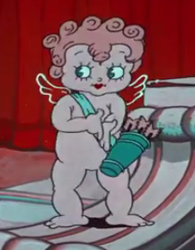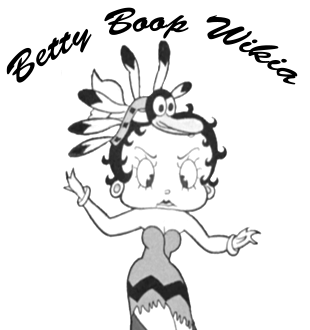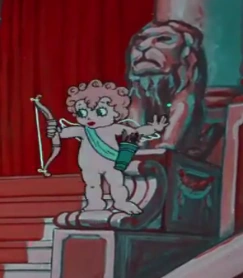| Cupid |
|---|
| Cupid | |
|---|---|
 | |
|
Name |
Cupid |
Cupid is a character who makes a appearance in Poor Cinderella during the ball sequence: the prince descends the staircase in a royal fashion when he stops and notices Betty Boop, then Cupid uses a hammer to smack him down the stairs to her.
In classical mythology, Cupid (Latin Cupido, meaning "desire") is the god of desire, erotic love, attraction and affection. He is often portrayed as the son of the love goddess Venus, and is known in Latin also as Amor ("Love"). His Greek counterpart is Eros.
Although Eros appears in Classical Greek art as a slender winged youth, during the Hellenistic period, he was increasingly portrayed as a chubby boy. During this time, his iconography acquired the bow and arrow that represent his source of power: a person, or even a deity, who is shot by Cupid's arrow is filled with uncontrollable desire.
In myths, Cupid is a minor character who serves mostly to set the plot in motion.
He is a main character only in the tale of Cupid and Psyche, when wounded by his own weapons he experiences the ordeal of love. Although other extended stories are not told about him, his tradition is rich in poetic themes and visual scenarios, such as "Love conquers all" and the retaliatory punishment or torture of Cupid.
Gallery
Trivia
- Cupid is winged, allegedly, because lovers are flighty and likely to change their minds, and boyish because love is irrational. His symbols are the arrow and torch, "because love wounds and inflames the heart." These attributes and their interpretation were established by late antiquity, as summarized by Isidore of Seville (d. 636 AD) in his Etymologies.
- The Romans reinterpreted myths and concepts pertaining to the Greek Eros for Cupid in their own literature and art, and medieval and Renaissance mythographers conflate the two freely. In the Greek tradition, Eros had a dual, contradictory geneaology. He was among the primordial gods who came into existence asexually; after his generation, deities were begotten through male-female unions. In Hesiod's Theogony, only Chaos and Gaia (Earth) are older. Before the existence of gender dichotomy, Eros functioned by causing entities to separate from themselves that which they already contained.
- At the same time, the Eros who was pictured as a boy or slim youth was regarded as the child of a divine couple, the identity of whom varied by source. The influential Renaissance mythographer Natale Conti began his chapter on Cupid/Eros by declaring that the Greeks themselves were unsure about his parentage: Heaven and Earth, Ares and Aphrodite, Night and Ether, or Strife and Zephyr.The Greek travel writer Pausanias, he notes, contradicts himself by saying at one point that Eros welcomed Aphrodite into the world, and at another that Eros was the son of Aphrodite and the youngest of the gods.





